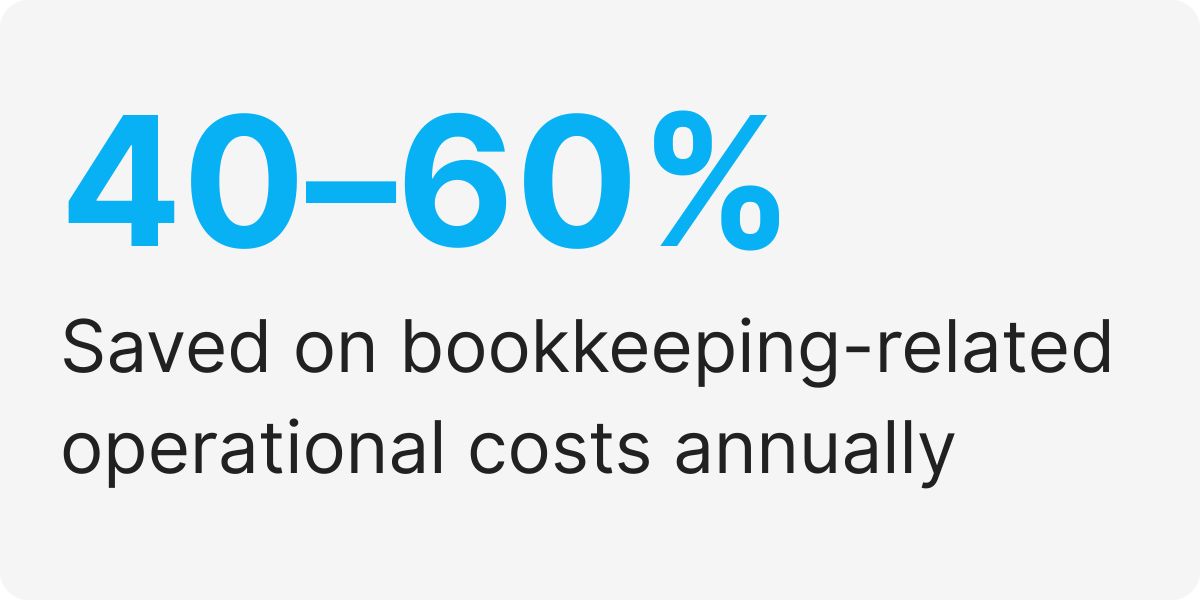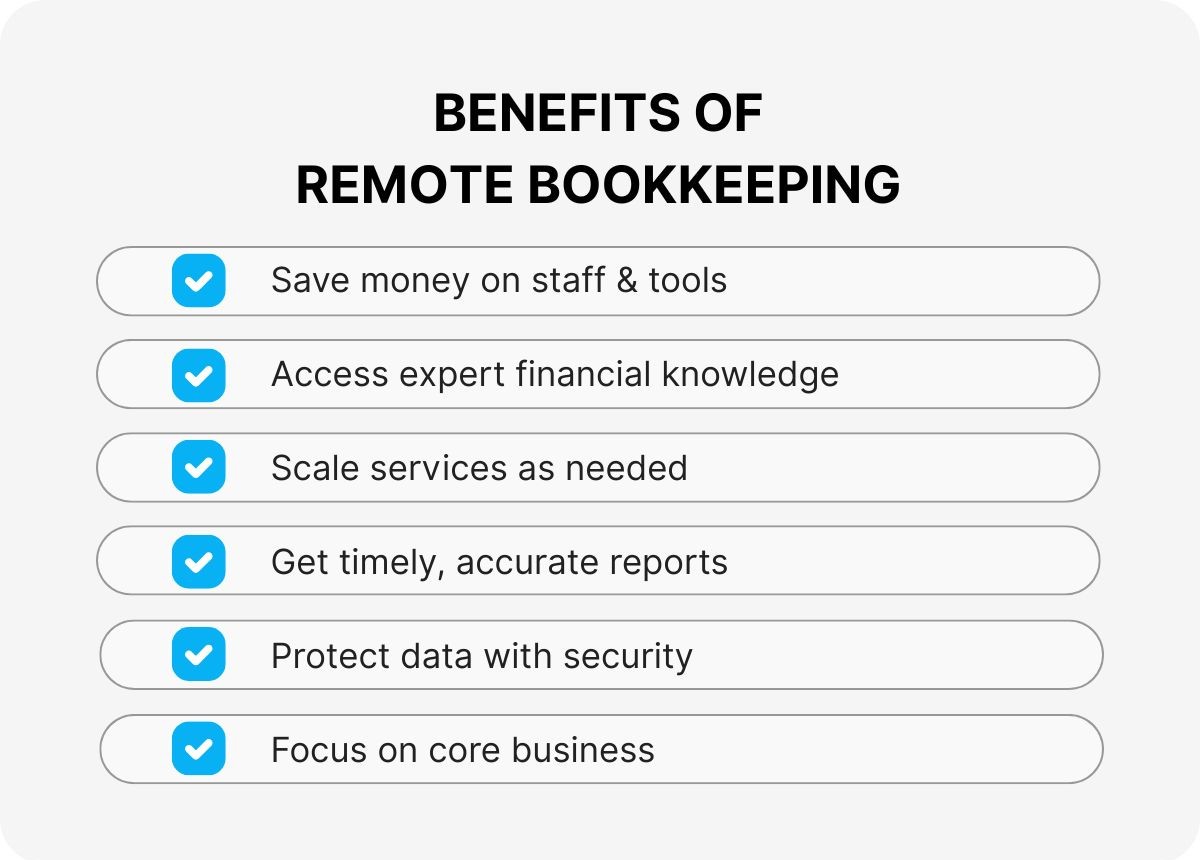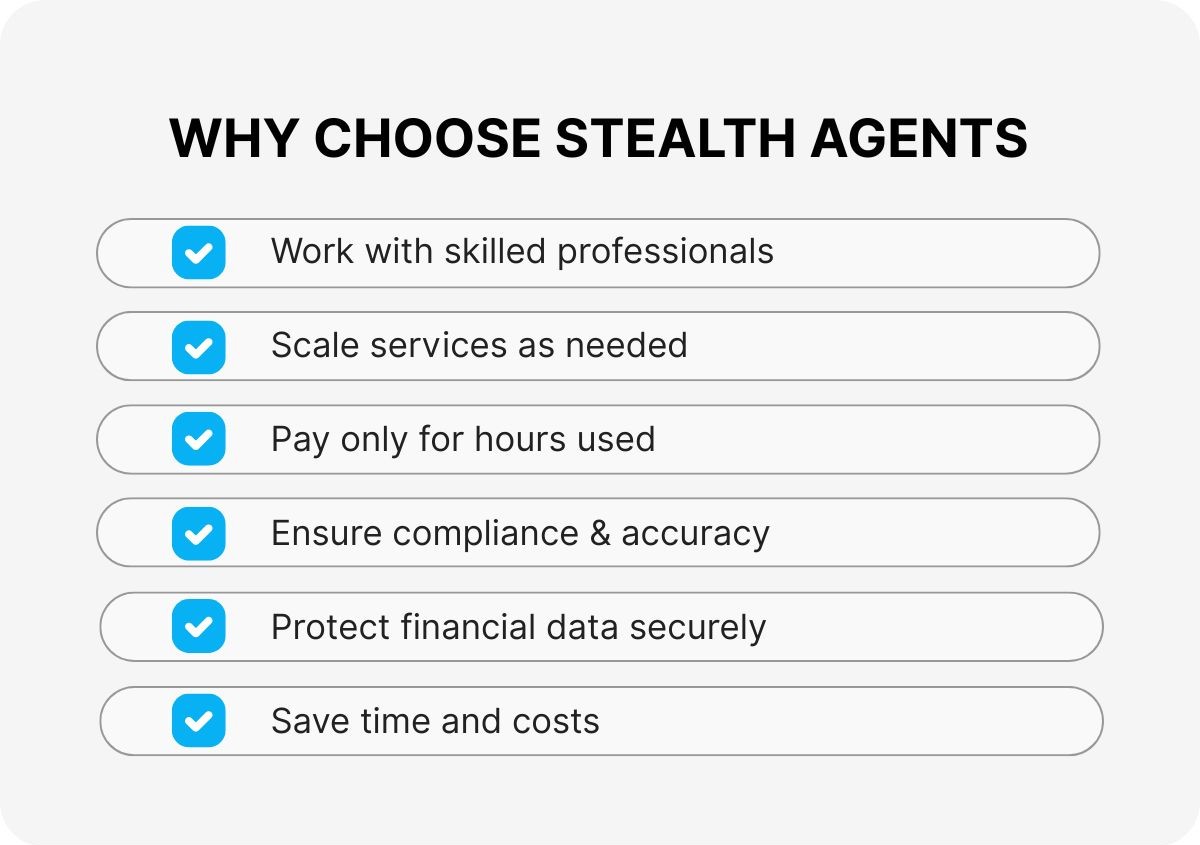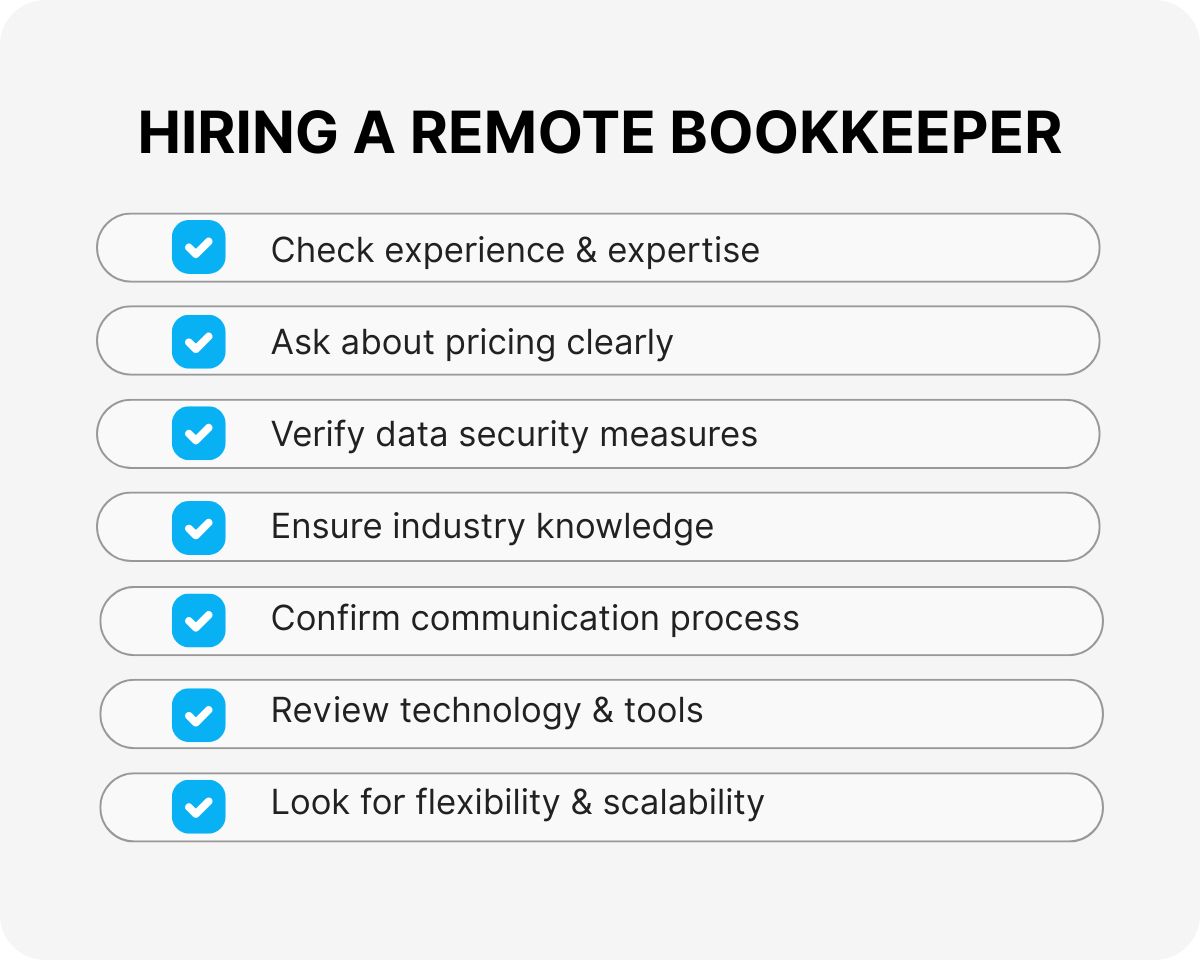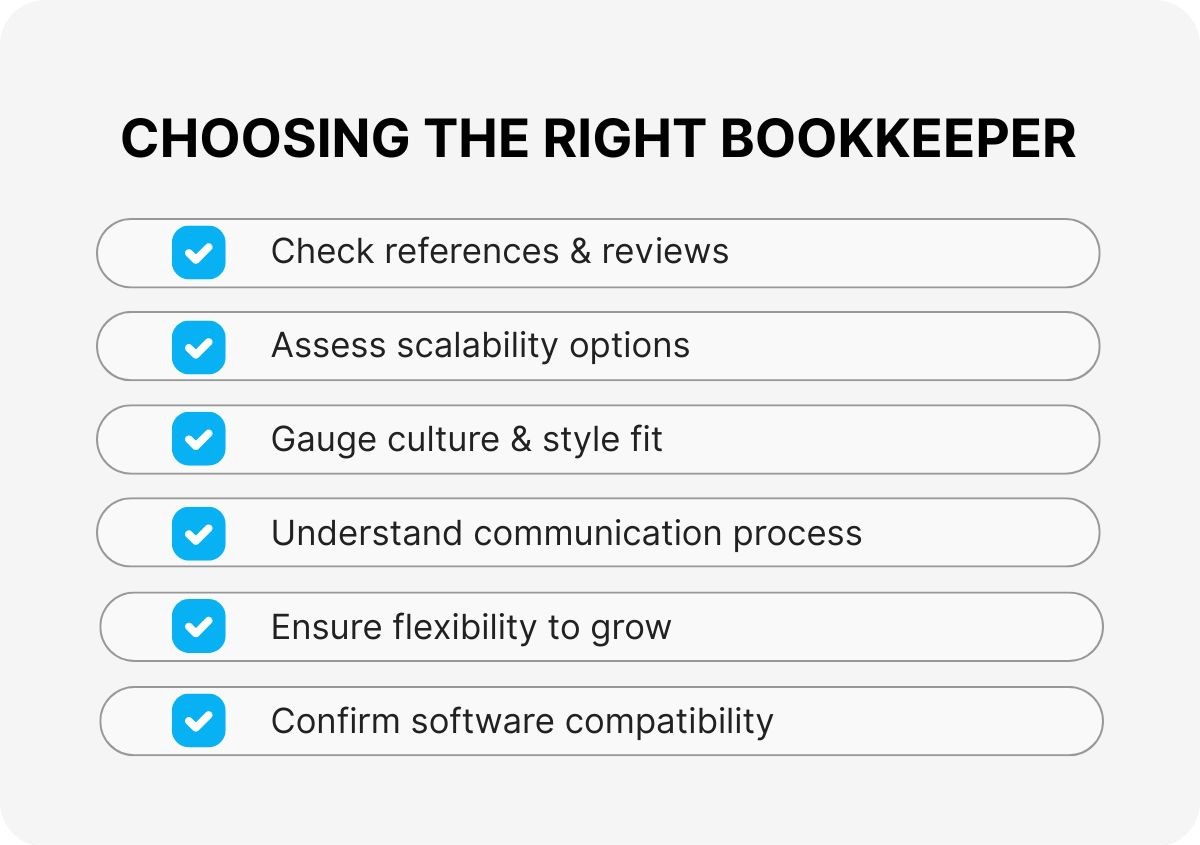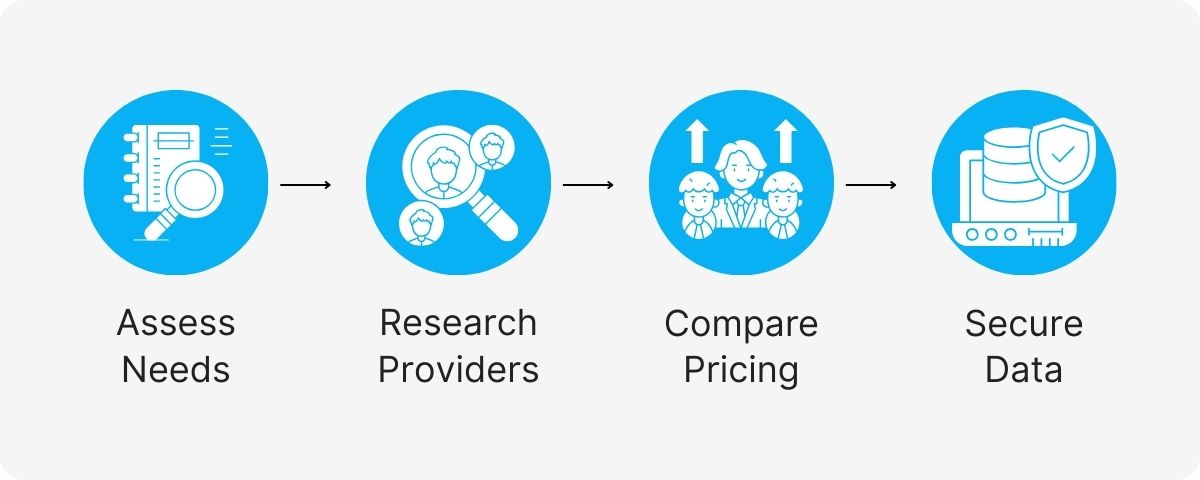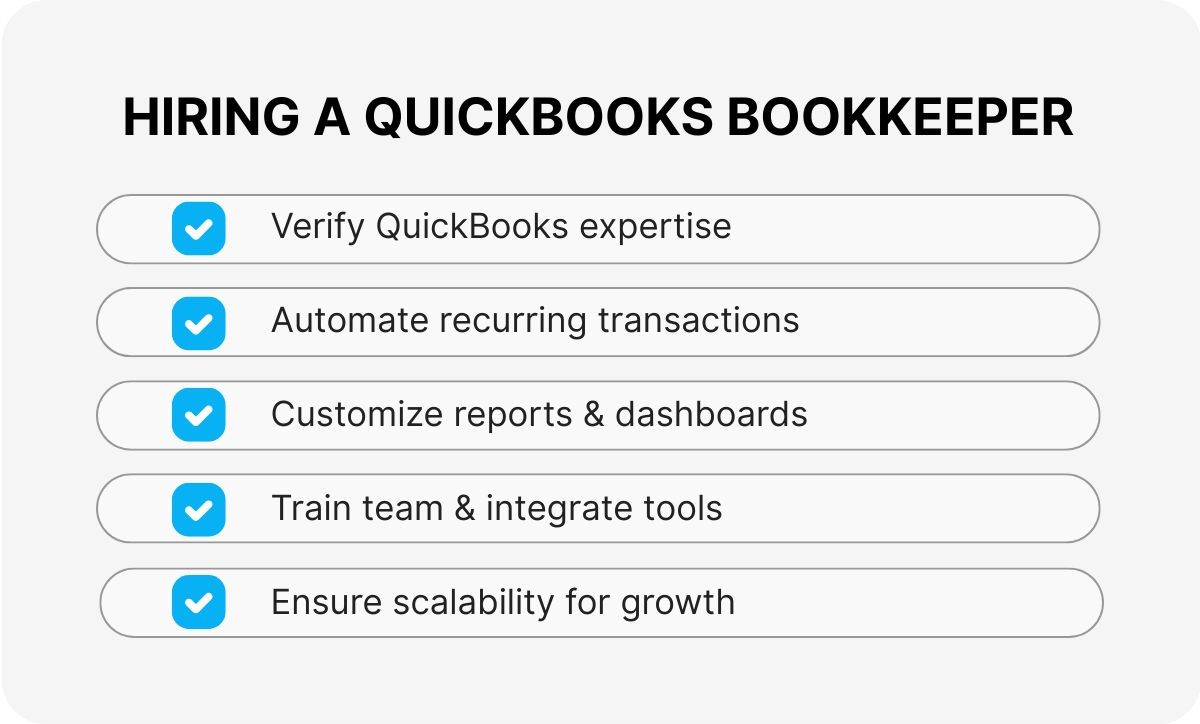Remote bookkeeping services help streamline your finances so you can focus on growing your business—and Stealth Agents makes it effortless by providing skilled virtual bookkeepers who handle everything from transaction tracking to tax prep. With expert support, you gain peace of mind, cleaner books, and more time to scale.
According to our recent survey, 75% of small businesses have adopted remote bookkeeping, citing a 40% reduction in administrative costs.
These virtual assistant services lists ensure accurate financial reporting, compliance with tax regulations, and real-time access to fiscal data.
So, how do remote bookkeeping services work? What are the key benefits? And which service should you choose? This guide explains it all and introduces why Stealth Agents could be your best solution for remote bookkeeping.
If you need to know more about our outsource bookkeeping price rate, book a pricing consultation with us today.
Can Bookkeeping be Done Remotely?
Bookkeeping can be done remotely. Bookkeepers can handle all tasks from anywhere in the world.
They use specialized software to record transactions, manage invoices, and prepare financial reports.
Remote bookkeeping offers flexibility, allowing businesses to access their financial data in real time.
What are Remote Bookkeeping Services?
Remote bookkeeping services manage your financial records from afar, using cloud-based software to track income, expenditures, and other financial details.
A professional bookkeeper handles everything, ensuring your books are accurate and up to date without needing to be physically present.
This service offers flexibility. You can access your financial data anytime, anywhere, and stay informed about your business’s health in real time.
It’s the most effective way to keep your finances in order, providing peace of mind and more time to focus on other business aspects.
What are the Benefits of Remote Bookkeeping Services?
1. Cost Savings
Firstly, these services save you a significant amount of money. You don’t have to worry about the expenses of hiring an in-house bookkeeper, such as salaries, benefits, and office space.
They often offer more flexible pricing models, such as charging by the Hour or hour project, which allows you to pay only for the needed services.
This efficiency extends to technology costs, as virtual assistant bookkeepers use their software and tools.
Ultimately, remote bookkeeping results in more streamlined finances and a healthier bottom line.
2. Access to Expertise
These professionals bring years of experience and specialized knowledge, ensuring that every financial detail is managed accurately and efficiently.
Unlike traditional in-house bookkeepers, they often employ a team of specialists who are up to date on the latest accounting standards and regulations.
This means businesses can tap into a wealth of expertise without investing in extensive training or recruitment.
They also leverage advanced software and tools to deliver precise and timely financial reports, giving businesses the confidence to make informed decisions.
3. Scalability and Flexibility
On the other hand, your business can grow and change without hiring additional in-house staff.
As your financial needs expand, remote workers can easily adjust their services to match your requirements, supporting more complex financial tasks.
This flexibility gives you access to bookkeeping services tailored to your industry and business size.
They often work on various schedules, ensuring that help is available when needed most, including after standard office hours.
4. Efficiency and Timeliness
These services offer seamless integration with various accounting software, ensuring that tasks such as data entry and report generation are completed swiftly.
With automated processes, businesses can avoid the common delays associated with manual bookkeeping.
Remote bookkeepers can also provide real-time updates, which means financial records are always current and accurate.
This efficiency level translates into timely decision-making, allowing businesses to pivot and strategize based on the latest financial data.
5. Enhanced Data Security
When you use these services, your financial information is stored digitally, which reduces the risks associated with paper records.
Digital systems offer advanced encryption, creating a secure barrier against unauthorized access.
Moreover, remote bookkeeping providers often use top-tier security protocols, continually updating their systems to fend off emerging threats.
These services also include regular backups, ensuring your financial data remains intact even in a cyberattack or system failure.
6. Improved Focus on Core Business Activities
Instead of spending valuable hours dealing with financial records, businesses can rely on professionals who handle these tasks remotely.
This ensures that bookkeeping is done accurately and frees time for strategic planning and other critical business activities.
Ultimately, companies can reduce distractions and dedicate more energy towards growth and development.
What Do Bookkeeping Services Stealth Agents Offer?
1. Invoice Management
A virtual assistant can create, send, and follow up on invoices to ensure timely payment.
They also track accounts receivable, helping you know exactly who has paid and who hasn’t, and reducing payment delays.
By organizing all your invoices in one place digitally, you keep your records accurate and easy to find.
They can also set up reminders for unpaid invoices, saving you from spending hours chasing clients.
With their help, your invoicing process becomes smoother and more consistent.
2. Accounts Payable
Managing accounts payable can be tedious, but a virtual assistant ensures your bills are paid on time, avoiding late fees and maintaining good vendor relationships.
They organize and schedule payments, ensuring your cash flow runs smoothly without surprises.
A virtual assistant double-checks amounts, due dates, and payment methods to prevent errors.
They also provide regular updates, so you always know where your money goes.
This work saves time and eliminates the stress of forgetting payments or mismanaging expenses.
3. Bank Reconciliation
A virtual assistant simplifies bank reconciliation by matching bank statements with recorded financial transactions.
They check for discrepancies, errors, or duplicate charges, ensuring all accounts remain accurate and up-to-date.
With their help, you will understand your cash inflows and outflows, which is essential for smoother financial operations.
They also create detailed reconciliation reports that you can refer to for audits or business decisions.
This level of accuracy can prevent costly financial mistakes down the road.
4. Financial Reporting
Virtual assistants help prepare detailed financial reports that show your business’s performance. They can analyze data from different sources, such as invoices, expenses, and bank transactions, and present it in an easy-to-understand format.
They create reports on revenue, profits, or expenses to help you evaluate your company’s financial health and enable you to make informed decisions about budgeting, spending, and growth planning.
With clear and timely reporting, you are always one step ahead in managing your finances.
5. Sales Tax Management
Handling sales tax is tricky, but a virtual assistant can calculate, track, and prepare taxes based on your location and business type.
They keep an organized record of taxable sales and payments, making tax filing season much less stressful.
Your assistant helps you avoid penalties or compliance issues by staying updated on tax rules and deadlines.
They also prepare sales tax reports to ensure your payments are accurate and timely.
Their support provides peace of mind, knowing your tax responsibilities are correctly handled.
6. Expense Tracking
A virtual assistant keeps a detailed record of all business expenses, ensuring every dollar is accounted for.
They organize receipts, input expenses into tracking software, and categorize them for better budgeting.
By providing regular expense summaries, they help you pinpoint areas where you could cut costs.
This level of organization is beneficial when preparing for tax deductions or reviewing how funds are spent.
Their attention to detail gives you a clear picture of your spending habits.
7. Cash Flow Management
Cash flow management becomes simpler with a virtual QuickBooks assistant that monitors expenses.
They track daily cash movement and provide updates on available finances, ensuring there are always enough funds for corporations.
By preparing projections, they can warn you about potential shortages or surpluses based on current trends.
This proactive approach helps prevent financial bottlenecks and keeps your business running smoothly.
With a virtual assistant, you gain confidence in managing your cash and avoiding surprises.
Why Choose Stealth Agents for Bookkeeping?
1. Access to Highly Skilled Bookkeeping Professionals
Virtual bookkeeping services connect you with experienced professionals managing diverse financial tasks.
They bring their expertise to organize your books, ensure compliance with financial regulations, and reduce costly errors.
By handling your accounts precisely, you free yourself from the stress of managing finances.
These professionals are trained to use advanced accounting tools to keep your financial records up-to-date.
That’s a dedication to your team without needing full-time hiring.
2. Services Can Be Scaled According to Business Needs
This service grows with your business, adapting to your needs whether you’re a stayover managing seasonal spikes in workload.
You can easily adjust the level of assistance if you require more bookkeeping attention during busy times or less during slow periods.
This flexibility allows you to efficiently manage your finances within your budget without overcommitting.
You won’t need to worry about onboarding or training; the service will always provide the proper support.
Perfectly, it’s perfect. It designed the growth.
growth per Hour
HiHour a virtual bookkeeper is budget-friendly, with services typically ranging between $10 and $15 per Hour.
Hour by Hour: You only cover the work done, eliminating unnecessary overhead costs.
This is far more affordable than hiring a full-time employee, saving you money on salaries, benefits, and office space.
Even at this price point, you still receive high-quality service tailored to your business’s needs and cost-effective professional bookkeeping without stretching your budget.
4. Robust Measures to Protect Financial Data
Virtual bookkeeping services prioritize protecting your sensitive financial information through advanced security measures.
Encrypted data transmission ensures that all information shared between you and the bookkeeper remains safe from unauthorized access.
Secure cloud storage provides additional protection while making it easy to access your records whenever you need them.
These professionals follow strict confidentiality protocols so your data stays private and secure.
With these safeguards, you can trust that your financial information is handled carefully.
Pros:
– Cost-effective
– Flexible
– Expert services
– Time-saving
How To Get Started with Stealth Agents Bookkeeping Services?
Step 1. Visit the official Stealth Agents website using your computer or mobile device. The site is designed to be user-friendly, making finding information about their bookkeeping services easy. Please take a moment to explore the pages to understand how they can help your business.
Step 2. Book a Free Discovery Call
Click on the option to schedule a free discovery call from the website. During the call, you’ll review our business needs and ask any questions about their services. A representative will then guide you through how Stealth Agents can meet your requirements.
Step 3. Choose a Service Package That Fits Your Business Requirements
After the discovery call, review the service packages offered to see which best suit your business needs and budget. The team will assist you in selecting the right plan based on your workload, goals, and financial situation. You’ll receive your pricing details to ensure there are no surprises.
Step 4. Begin Utilizing Their Bookkeeping Services
Once you’ve chosen your onboarding process, begin setting up your bookkeeping support quickly. You’ll provide the details, and their team will start organizing and managing your finances. From there, you can focus on other business priorities while they handle your bookkeeping seamlessly.
7 Things to Look For When Hiring a Remote Bookkeeper and Ensuring Your Financial Data is Secure
1. Check Their Experience and Expertise
A skilled remote bookkeeper should have solid experience managing accounts for businesses like yours.
Whether you need help with payroll, reconciliations, or tax preparation, you should be able to handle diverse tasks confidently.
For example, a tech business’s remote bookkeeper should know industry affairs and past clients or look at reviews to understand their track record.
2. Ask About Their Pricing and Transparency
Before hiring, understand the remote bookkeeper’s costs to ensure their services fit your budget.
Many remote bookkeeping services charge hourly or monthly fees, so ask for a clear breakdown of costs upfront.
For example, some businesses prefer the predictability of flat rates, while others appreciate the flexibility of paying only for hours worked.
Look for affordable options if necessary, as many affordable bookkeeping services provide excellent quality without breaking the bank.
Confirm what’s included in the package, such as payroll or tax filing, and ensure everything is clear in the agreement to avoid hidden charges.
How Much Should You Budget for Bookkeeping and Accounting Services?
When planning for professional bookkeeping and accounting support, costs can vary widely based on your business’s needs, the complexity of your books, and the scope of services you require.
Bookkeeping services often cost $20 to $75 per hour (or $250 to $750 monthly for ongoing help). This typically covers essentials like managing transactions, reconciling bank statements, and basic reporting.
If your business demands more advanced oversight, such as financial analysis, budgeting guidance, or compliance support, you might need accounting or controllership services. These are generally priced higher, ranging from $100 to $175 per hour.
Hour companies seeking both bookkeeping and controller-level expertise, bundled monthly packages are popular, with costs commonly falling between $1,000 and $2,500 per month.
Your final investment depends on transaction volume, the number of accounts, and the reporting frequency.
Tip: Avoid comparing rates between providers like Bench, QuickBooks Live, or KPMG Spark. Many reputable services will tailor their pricing to your business size and industry, ensuring you only pay for what you need.
Consider what features matter to you- payroll management or tax filing—and confirm they’re included before committing.
Transparent pricing helps you avoid surprises down the road.
3. Verify Their Security Measures for Handling Data
Your financial data is sensitive, so it’s crucial to know that private bookkeeping companies will protect it if they use secure cloud systems, encryption tools, or multi-factor authentication to keep your information safe.
Reputable providers of remote accounting services follow strict confidentiality policies and adhere to industry security standards.
By partnering with reliable bookkeeping services, you can rest assured that your files and accounts will remain private and secure.
Always confirm their steps in case of a data breach to prepare you for any situation.
4. Choose a Bookkeeper Who Understands Your Industry
Different industries have unique financial needs; a professional remote bookkeeper should understand yours.
For example, a bookkeeping agency specializes in managing inventory accounts, while a remote bookkeeper for a tech business will understand software development costs or SaaS revenue tracking.
This ensures accurate and relevant reporting, saving you time and correcting mistakes specific to your niche.
Ask potential bookkeepers if they’ve worked with businesses like yours and understand relevant tax or compliance rules.
The right expertise can make a huge difference in reducing errors and financial stress.
5. Find Out Their Communication Process
Good communication is key when working with a remote bookkeeping business since everything is handled virtually.
Ask how they’ll stay in touch—through email, video calls, or a messaging platform—and how quickly they respond to questions.
A professional team of remote bookkeepers or virtual assistant bookkeeping services should provide regular updates on your accounts and ensure you feel supported. A dedicated remote bookkeeping assistant who knows your account inside and out can streamline communication.
If you need support at certain times of the day, ensure their time zone aligns with yours or they have flexible hours.
6. Review Their Technology and Tools
Modern tools are a huge part of remote bookkeeping solutions, so ensure the bookkeeper is skilled in your business’s platforms.
Cloud-based software like QuickBooks, Xero, or NetSuite should be part of their skill set, ensuring your accounts are easy to access and manage.
Some off-site bookkeeping services even include setup or training as part of their service, which can save you extra costs. Tech integrations, offsiteing expenses, or generating reports add convenience and save you time.
Confirm they’re comfortable and adapting to your existing systems, or can recommend software suited to your needs.
7. Look for Flexibility and Scalability
Your business needs to adapt over time, so it has services. Whether you’re handling a few now or managing a more complex workload as your business grows, their offerings should meet your needs.
Many offsite bookkeeping providers allow you to scale up or down during busy seasons or slower periods, saving you money and stress.
Small businesses can often find an affordable and reliable bookkeeper who works on their terms, while larger companies might benefit from having access to more staff or advanced analytics.
Flexibility ensures you’re not paying for services you don’t need and keeps options open for future growth.
Is Online Bookkeeping Worth It for Small Businesses?
For most small businesses, online bookkeeping isn’t just a nice-to-have—it’s a smart move that can save you both time and headaches.
Let’s be honest: juggling finances while running your core operations is a recipe for overwhelm.
By using remote bookkeeping services, you can free up valuable hours to invest in growing your business while the experts handle the number crunching.
The perks? You’ll benefit from cloud-based platforms like QuickBooks, Xero, or NetSuite, which streamline your accounting and deliver real-time visibility into your financial health.
Instead of sifting through receipts or manually updating ledgers, you’ll get timely reports and accurate statements.
Outsourcing your bookkeeping also means you can access professional insights and avoid costly errors, allowing you to feel more confident come tax season or when making big decisions.
Small shops, solo entrepreneurs, and even fast-scaling startups all find that leveraging online bookkeeping is an investment that pays off—often by reducing stress, improving accuracy, and supporting smarter growth strategies.
How to Evaluate the Fit, Style, and Scalability of a Remote Bookkeeping Service
Finding the right remote bookkeeping service isn’t just about crunching numbers—it’s about finding a partner who fits your business’s rhythm and can grow with you. Here’s what to look for before making your decision:
Check References and Reviews
Start by asking for references from businesses that mirror your industry or size.
Hearing directly from current or past clients reveals how the service delivers—do they stick to timelines, communicate clearly, and resolve issues promptly? Online reviews (on platforms like Google or Trustpilot) can shed light on glowing wins and red-flag moments. Use these insights to build a list of smart questions for your discovery call.
Assess Scalability
Consider not just what you need now, but how your needs will change as your business evolves.
Does the provider offer basic bookkeeping, plus the option to scale up to more strategic services—like forecasting, analytics, or access to additional support staff? A flexible service can seamlessly adapt, whether you’re dealing with a transaction surge or need help preparing for tax season.
Be clear on limits around things like transaction volume or service upgrades.
Gauge Culture and Working Style Fit
A bookkeeping service should mesh with your company culture and communication style. Ask:
- Will I work with the same person consistently, or is there a rotating team?
- Do they prefer regular video updates, weekly emails, or online dashboards?
- Are they comfortable with your existing tools—or will you need to adapt to theirs?
Be upfront about your preferences, whether you value a hands-on advisor, minimal-touch automation, or something else.
Understand Their Communication Process
Great communication ensures nothing slips through the cracks. Find out how quickly they respond, what channels they use (email, Slack, video call), and how they share updates.
A collaborative partner won’t leave you guessing about your finances or when the books will be closed.
Look for Room to Grow
Finally, the best remote bookkeeping services grow alongside your business.
Whether you’re a startup handling your first big order or scaling rapidly, look for a provider who can flex with your needs. Ask about:
- Adding or reducing services during seasonal swings
- Integrating with new software as your company evolves
- Support for expanding into new markets or revenue streams
By digging into these areas—references, scalability, fit, communication, and growth—you’ll land a remote bookkeeping partner who keeps your books tidy and gives you room to scale with confidence.
How to Find the Best Virtual Bookkeeping Service
Finding the right remote bookkeeper for your business takes some thoughtful steps—but don’t worry, it’s easier than you might think. Here’s how to narrow it down:
1. Identify Your Current and Future Needs
List your present financial management tasks—invoicing, payroll, expense tracking, and bank reconciliation. Then, consider where your business is headed.
Will you eventually need help with budgeting, cash flow forecasting, or preparing for rapid growth? The goal is to partner with a service that can handle your needs today and grow with you tomorrow.
2. Research Providers with Relevant Experience
Not all bookkeepers are created equal. Look for virtual bookkeeping services with a proven track record with businesses like yours.
For example, a restaurant may need inventory expertise, while a software startup requires someone familiar with revenue recognition for SaaS subscriptions.
Sift through testimonials, case studies, or client reviews to gauge their strengths.
3. Check and Compare Pricing
Virtual bookkeeping prices vary widely—some charge by the hour, others by the number of transactions, and some offer monthly packages.
Make sure you get a clear understanding of what’s included in the quoted price. Don’t forget to look for any “gotcha” fees for extra transactions, onboarding, or support!
4. Prioritize Data Security
Confidence in your provider’s security protocols is non-negotiable. Ask about encryption, cloud storage safety measures, and whether they use secure login methods like two-factor authentication.
It’s okay to get technical—they should be able to explain how they keep your sensitive financials safe and what protocols they follow in the unlikely event of a breach.
By following these steps and asking the right questions, you’ll be well on your way to finding a reliable virtual bookkeeping service tailored to keeping your finances healthy and your mind at ease.
How to Research and Evaluate Remote Bookkeeping Companies
To get the most out of remote bookkeeping, start by digging into each company’s track record and expertise.
Focus on those that specifically support businesses similar to yours—whether you’re a fast-moving SaaS startup, a retail shop, or a nonprofit with its own reporting quirks.
- Check for Reviews and Credibility: Scour online reviews, testimonials, and client case studies. Platforms like Trustpilot, Google Reviews, and even industry forums can give valuable insights into their reliability and responsiveness.
- Assess Experience and Specialization: Ask about their experience with businesses in your sector. A bookkeeper accustomed to handling manufacturing inventory will have a different knowledge base from one who understands digital product revenue streams or donor management for charities.
Compare Pricing Models
Your budget matters, so get clear on what you’ll be paying and what you’re paying for. Some providers bill by the transaction, some by the hour, and others use flat monthly rates for a predictable expense. Pin down which model best suits your current volume and plans for growth.
- Ask for Transparent Pricing: Request a full breakdown, and watch out for extra costs like setup fees, special reporting, or end-of-year wrap-ups that might sneak onto your invoice.
- Find the Right Fit: If you’re a new business, an hourly plan might help keep things flexible as your needs shift. Growing or established teams might benefit from a set monthly package with more robust support options.
Review Their Security Practices
Handing over your books means trusting someone with sensitive data, so security should be non-negotiable.
- Investigate Data Protection Protocols: Reputable providers use well-known cloud accounting systems, multi-factor authentication, and robust encryption tools. Ask about their confidentiality agreements and compliance with security standards such as SOC 2 or GDPR.
- Confirm Breach Procedures: Make sure they have clear, actionable steps in case of a data breach—knowing their process gives you peace of mind and a backup plan if the unexpected happens.
By taking these steps, you’ll narrow your options to qualified, transparent, and trustworthy bookkeepers, making your remote partnership smooth and stress-free.
Is Hiring a QuickBooks Bookkeeper Worth It?
If your business already runs on QuickBooks or is considering making the switch, hiring a bookkeeper with deep experience in this software can be a real game-changer.
These specialists know the ins and outs of QuickBooks and can also set up your charts, automate recurring transactions, and streamline your monthly or year-end reporting (so you’re not scrambling at tax time).
A QuickBooks-savvy bookkeeper can:
- Save you time by managing day-to-day entries, reconciliations, and chasing down those little errors that always crop up.
- Tailor reports and dashboards to show what matters to your business—not just cookie-cutter financials.
- Help train your team or recommend time-saving integrations within QuickBooks Online, Xero, or similar platforms as your business evolves.
However, it’s also smart to think ahead. If you anticipate rapid growth, international transactions, or need more advanced analytics, ensure your prospective bookkeeper is open to learning new tools or scaling with you—not just sticking with what they know.
Why Choose Stealth Agents
At Stealth Agents, we combine world-class talent, cutting-edge tools, and unmatched service to help you scale faster and work smarter. Our team is handpicked from the top 1% of virtual assistants, ensuring you get the expertise and professionalism you deserve. Recognized by Forbes and praised by clients worldwide, we are committed to delivering results you can trust.
Highlights:
-
Hire 10–15+ years experienced executive assistants – Gain the advantage of seasoned professionals who understand complex business needs and deliver high-level support.
-
Dedicated account manager—Enjoy personalized guidance and a single point of contact for seamless communication and project management.
-
Cloud platform – Access and manage your tasks anytime, anywhere, with our secure and user-friendly platform.
-
Best reviews on Google – Join hundreds of satisfied clients who rate us highly for reliability, efficiency, and outstanding results.
-
Top 1% virtual assistants—Work with elite talent who consistently exceed industry standards.
-
Recognized by Forbes as a Top 2 virtual assistant service – Trust a brand celebrated for excellence and proven impact.
Outsourcing your bookkeeping can save you time and money. Let Stealth Agents handle your finances so you can focus on growing your business. Get started today!
Frequently Asked Questions
What qualifications should I look for when outsourcing bookkeeping services?
Look for bookkeepers who have certifications like CPA or QuickBooks, at least 3-5 years of experience in your type of business, and knowledge of tax rules. Check their credentials with trusted accounting organizations. Make sure they know how to use modern accounting software like QuickBooks Online, Xero, or NetSuite.
How do I transition from in-house bookkeeping to outsourced services?
Start by organizing your financial records and writing down your current processes. Plan for some overlap time between your current bookkeeper and the new team. Share access to your accounting software, bank accounts, and vendor details. With good planning, the switch usually takes 1-2 weeks.
What happens if my outsourced bookkeeper makes mistakes in my financial records?
Good bookkeeping companies have insurance to cover mistakes and offer to fix errors. Set clear agreements at the start about accuracy, timelines for fixing mistakes, and who is responsible. Regularly review your records to catch problems early. Choose a provider with strong quality checks.
Can outsourced bookkeepers handle industry-specific rules?
Yes, many bookkeeping companies focus on certain industries like healthcare, construction, or retail. They know the special rules for those fields, like HIPAA for healthcare or sales tax rules for retail. Make sure the company you pick has experience with your industry’s needs.
What software can remote bookkeeping services work with?
Most remote bookkeepers use popular tools like QuickBooks, Xero, FreshBooks, and Sage. They can also connect with payment systems like Stripe or PayPal, customer tools like Salesforce, and inventory or banking platforms. Ask about how they connect these tools and if there are extra costs.
How do I stay in control of my finances when outsourcing bookkeeping?
Stay involved by reviewing your finances regularly, using dashboards, and having scheduled check-ins. Keep control of your bank accounts and approve payments yourself. Ask for monthly reports like profit/loss statements and cash flow summaries. Set rules for approving big transactions.
What if my outsourced bookkeeping provider goes out of business?
Pick a company that stores your data in cloud systems you can access anytime. Make sure your contract says you own the data and can export it. Keep copies of important files and passwords. Good companies often have backup plans or partners to keep things running.
How do time zones affect outsourced bookkeeping?
Different time zones can be helpful because work can get done while you sleep. Set clear schedules for communication and response times. Many companies offer hours that overlap with your time zone. Use tools like shared calendars to manage deadlines and urgent tasks.
What contract terms should I negotiate when outsourcing bookkeeping?
Focus on terms like service quality, data security, how to end the contract, and limits on price increases. Start with monthly contracts instead of long ones. Include rules for fixing mistakes, adding services, and protecting your data. Clearly define what work will be done and when.
How can I measure the value of outsourcing my bookkeeping?
Compare the cost of outsourcing to what you spent on in-house bookkeeping, including salaries, benefits, and software. Look at how much time you save and how that time is used for other important tasks. Check if your financial reports are more accurate and faster. Also, think about the peace of mind you get from having professionals handle your books.


